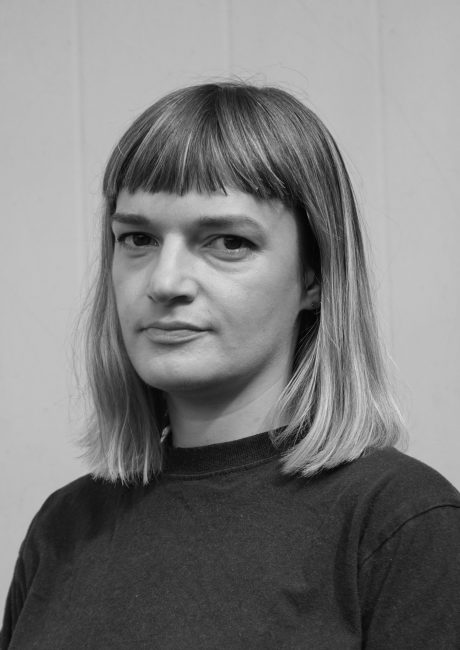
KU Eichstätt-Ingolstadt
Am Marktplatz 2
85072 Eichstätt
Jessie.Martin@ku.de
Jessie Martin is a sociologist and photographer of urban spaces. She studies the interplay between places, people, politics and ecology and utilises interdisciplinary visual approaches to reimagine the potential of the spaces we live in while investigating their formation and conceptualisation. An ongoing theme in her work is the right to the city and land ownership; her MA thesis explored and questioned the rise of privately owned and managed public squares in London.
She has a BA in photographic arts from the University of Westminster, and an MA in photography and urban cultures from Goldsmiths, University of London. She lectured on the BA photography course at the University of West London from 2018 to 2024, leading modules in Narrative Photography and Photography and Society, while teaching photography at Richmond upon Thames College from 2019 to 2024. She has coordinated conferences held at the Tate Britain and Goldsmiths, University of London, and has a photographic arts practice, curating and participating in exhibitions.
Jessie has presented papers at conferences held by the University of Sussex and the Zagreb Institute of Art History, and published in peer reviewed journals. In 2023 her text ‘Deconstructing understandings of emptiness: an examination of representations of transitory space and ‘non-place’ in photography’, was published in the book ‘Watching, Waiting: The Photographic Representation of Empty Places’, published by Leuven University Press. She has diverse research interests and after undergoing research into the topic of autobiographical memory and historical family archives, wrote a chapter published in 2023 by IGI Global in a book titled ‘The Handbook of Research on the Relationship between Autobiographical Memory and Photography’.
Fracturing human-nature relations: how different forms of industrial capitalism are shaping the organisation of natural resources in cities.
My research project adopts a transdisciplinary approach to investigate the correspondence of humanity and nature by examining how industrial urban spaces are experienced through their organisation of natural resources and sociality. The abstraction of nature from human-dominated environments has caused understandings of environmental damage to become isolated from the physical presence of capitalism which organises these spaces and their relations. This PhD builds on developing dialogues that seek to synthesise understandings of nature and society in relation to capitalism.
My research uses case studies on German cities with different industrial specialisms, following the capital flows of industry to comparative European cities, to investigate how these specificities determine the practicing of place through nature. Disciplinary differences between natural and social sciences ensure separation between the vocabulary and methods used to elucidate nature and society’s interconnection. Through a transdisciplinary approach I expand on current discourses that disrupt this separation, developing visual methods for the effective communication of world ecological thought in relation to local place, mechanisms of industry, and capital as the driving force of space production. I will develop an analytical framework investigating how cities function as constructions of nature, as produced through the mechanisms of capital.
The human relations encapsulated through cultural and political power are natural relations. The case studies in my thesis investigate the distinct ways that capital works through nature to produce spaces and spatial practices. Case studies on Frankfurt, Hamburg and Ludwigshafen, represent how different forms of capital accumulation, specifically finance, shipping, and pharmaceutics, produce places through the organisation of natural resources and social life. This differentiation enables me to analyse and compare differences in human-nature relations, through the organisation of capital as evidenced through industry. I will do preliminary background research on industrial cities focusing on their use of natural resources such as soil, metals, water and air, mapping the usage of resources to guide subsequent observatory research. My initial research will concentrate on where natural resources are present in cities, and how they are organised through industry. This will be followed by visual ethnographic study which investigates how these spaces are enacted and navigated through human activity and social life.
Capitalism has restructured our understanding of nature and society on cartesian terms. To consider nature as a singular entity existing externally from society fragments understandings of power, exploitation, work, and liberation. The result is a fracturing of our ability to comprehend urban place as a continuous organisation of nature. By analysing the collusion of active elements that constitute urban place, cities can be deconstructed as vectors of the climate crisis functioning in closer proximity to humanity than the nature-society divide suggests. My research will utilise Marxist geographers such as David Harvey to integrate a critique of capitalism as the system responsible for organising urban spaces through industrial concerns, while simultaneously generating metabolic rifts through environmental degradation. Changes in the Earth System are due to the capitalist organisation of nature. My approach will be informed by Marx’s concepts of ‘metabolic interaction’ and ‘metabolic rift’, as interpreted by John Bellamy Foster, that elucidate this reorganisation. By methodologising and generating knowledge on the effects of this restructuring in terms of how place is practised through the systemic organisation of nature, my interdisciplinary research will provide an evidential and empirical basis for future environmental political critiques, and geographical and sociological study.